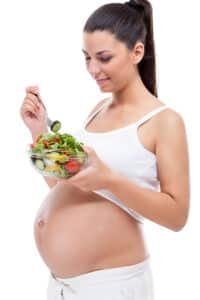Maintaining a healthy diet is important for everyone, but it becomes even more crucial during pregnancy. As a pregnant woman, you need to ensure that you are getting all the necessary nutrients for both you and your baby's growth and development. However, many women wonder if it is safe to diet during pregnancy.
The answer is not a straightforward yes or no. While it is generally not recommended to actively try to lose weight during pregnancy, following a healthy and balanced diet can help you manage your weight and ensure that you and your baby are getting all the necessary nutrients. In fact, according to the American Pregnancy Association, "the type of diet we encourage during pregnancy refers to fine-tuning your eating habits to ensure you are receiving adequate nutrition for the health of you and your baby."
Contents
Understanding Pregnancy and Nutrition

Maintaining a healthy diet is always important, but it becomes even more crucial during pregnancy. Eating well can help ensure that both the mother and the developing fetus receive the necessary nutrients for optimal growth and development.
During pregnancy, the body's nutritional needs change. The mother's body requires additional nutrients to support the growth and development of the fetus, as well as to prepare for breastfeeding. The following are some of the essential nutrients that are particularly important during pregnancy:
- Folate: Folate is a B vitamin that is important for the healthy development of the fetus's brain and spinal cord. It can be found in leafy green vegetables, citrus fruits, and fortified grains.
- Iron: Iron is necessary for the production of hemoglobin, which carries oxygen to the body's cells. During pregnancy, the body requires extra iron to support the growth of the placenta and the fetus. Good sources of iron include lean meat, poultry, fish, beans, and fortified grains.
- Calcium: Calcium is important for the development of the fetus's bones and teeth. It can be found in dairy products, leafy green vegetables, and fortified juices.
- Vitamin D: Vitamin D is necessary for the absorption of calcium and the healthy development of the fetus's bones and teeth. It can be found in fortified milk and cereals, as well as in sunlight.
It is important to note that pregnant women should avoid certain foods that can be harmful to the developing fetus, such as raw or undercooked meat, fish, and eggs, as well as unpasteurized dairy products. Additionally, pregnant women should limit their intake of caffeine and avoid alcohol and tobacco.
Overall, maintaining a healthy diet during pregnancy is essential for the health and well-being of both the mother and the developing fetus. By consuming a variety of nutrient-dense foods and avoiding harmful substances, pregnant women can help ensure a healthy pregnancy and a healthy baby.
Dieting While Pregnant: Is It Safe?
Pregnancy is a time when a woman's body undergoes many changes, including weight gain. It is natural to want to maintain a healthy weight during pregnancy, but is dieting while pregnant safe?
According to the American Pregnancy Association, it is not recommended to actively try to lose weight during pregnancy. However, it is important to maintain a healthy and balanced diet to support the growth and development of the fetus.
Restricting calories or skipping meals can deprive the baby of essential nutrients and can lead to complications such as premature birth, low birth weight, and developmental problems.
Instead of dieting, focus on making healthy food choices and eating a variety of nutrient-dense foods. Incorporating vegetables, fruits, whole grains, lean protein, and healthy fats into your meals can help ensure that you and your baby are getting the necessary nutrients.
It is also important to stay hydrated by drinking plenty of water and avoiding sugary drinks. Consult with a healthcare provider or a registered dietitian to develop a meal plan that meets your individual needs and preferences.
In conclusion, while it may be tempting to try to lose weight during pregnancy, it is not recommended. Instead, focus on making healthy food choices and maintaining a balanced diet to support the growth and development of your baby.
The Risks of Dieting During Pregnancy
Dieting during pregnancy can put both the mother and the baby at risk. While it is important to maintain a healthy weight during pregnancy, it is equally important to ensure that the mother and baby are getting all the necessary nutrients for healthy growth and development.
Impact on Fetal Development
Dieting during pregnancy can negatively impact fetal development. The baby needs a steady supply of nutrients to grow and develop properly, and restricting calories or certain food groups can lead to fetal malnutrition. This can result in low birth weight, developmental delays, and other health complications for the baby.
Increased Risk of Nutrient Deficiencies
Dieting during pregnancy can increase the risk of nutrient deficiencies in both the mother and the baby. Restricting calories or certain food groups can lead to a lack of essential vitamins and minerals, such as folic acid, iron, and calcium. This can lead to anemia, birth defects, and other health complications for both the mother and the baby.
Potential for Eating Disorders
Dieting during pregnancy can also increase the potential for developing eating disorders. Pregnancy is a time when women are already vulnerable to body image issues and societal pressure to maintain a certain weight. Dieting can exacerbate these issues and lead to unhealthy eating habits that can continue after pregnancy.
In conclusion, dieting during pregnancy can have serious consequences for both the mother and the baby. It is important to maintain a healthy weight and eat a balanced diet during pregnancy to ensure optimal health for both.
Healthy Alternatives to Dieting
Pregnancy is a time of significant change for a woman's body, and it is important to maintain a healthy weight during this time. However, traditional dieting methods are not recommended during pregnancy, as they can restrict important nutrients such as iron, folic acid, and other essential vitamins and minerals. Instead, there are healthy alternatives to dieting that can help women maintain a healthy weight while also ensuring that both they and their baby are getting the nutrients they need.
Balanced Nutritional Intake
One of the most important things a pregnant woman can do to maintain a healthy weight is to focus on a balanced nutritional intake. This means eating a variety of foods from all the food groups, including fruits, vegetables, whole grains, lean proteins, and healthy fats. It is also essential to stay hydrated by drinking plenty of water throughout the day.
To ensure that they are getting the right nutrients, pregnant women should consult with their healthcare provider or a registered dietitian. They can provide guidance on how many calories a woman needs based on her individual needs and help her create a healthy meal plan that includes all the necessary nutrients.
Regular Light Exercise
Regular light exercise is also an excellent way for pregnant women to maintain a healthy weight. Exercise can help boost metabolism, improve circulation, and reduce stress, all of which can contribute to a healthy pregnancy.
Pregnant women should aim to exercise for at least 30 minutes a day, most days of the week. However, it is important to consult with a healthcare provider before starting any exercise program to ensure that it is safe for both the mother and the baby.
Prenatal Vitamins

Prenatal vitamins are an essential part of a healthy pregnancy. They contain essential nutrients such as folic acid, iron, and calcium, which are critical for the baby's development. They can also help ensure that the mother is getting all the nutrients she needs.
It is important to take prenatal vitamins as directed by a healthcare provider. Some women may need additional supplements, such as vitamin D or omega-3 fatty acids, which can also be discussed with a healthcare provider.
In conclusion, while traditional dieting methods are not recommended during pregnancy, there are healthy alternatives that can help women maintain a healthy weight while also ensuring that they and their baby are getting the nutrients they need. By focusing on a balanced nutritional intake, regular light exercise, and prenatal vitamins, pregnant women can promote a healthy pregnancy and a healthy baby.
Consulting Healthcare Professionals
Before embarking on any dietary changes during pregnancy, it is crucial to consult with a healthcare professional. This includes a doctor, midwife, or a registered dietitian. They can provide personalized recommendations based on your health status, medical history, and dietary preferences.
During pregnancy, it is essential to consume a balanced diet that includes a variety of nutrients. Consulting a healthcare professional can help ensure that you are meeting your nutritional needs and not putting yourself or your baby at risk.
If you have any medical conditions or dietary restrictions, your healthcare provider can help you develop a meal plan that meets your specific needs. They may also recommend supplements such as folic acid, iron, or calcium to ensure that you are getting enough of these essential nutrients.
It is also important to consult with your healthcare provider if you are considering weight loss during pregnancy. While weight maintenance is usually recommended during pregnancy, some women may need to lose weight for medical reasons. In this case, your healthcare provider can help you develop a safe and effective weight loss plan.
Overall, consulting with a healthcare professional is an essential step in ensuring a healthy pregnancy. They can provide personalized recommendations and guidance to help you meet your nutritional needs and maintain a healthy weight during pregnancy.
Conclusion
In conclusion, maintaining a healthy diet during pregnancy is crucial for the health and development of both the mother and the baby. The recommended daily caloric intake for pregnant women is approximately 300 extra calories per day, which should come from a balanced diet of protein, fruits, vegetables, and whole grains. Sweets and fats should be kept to a minimum.
It is important to note that dieting to lose weight during pregnancy is not recommended. Instead, pregnant women should focus on maintaining a healthy weight and consuming nutrient-dense foods. Adequate intake of essential nutrients such as folate, iron, and vitamin D is also important for a healthy pregnancy.
While certain foods should be avoided during pregnancy, such as raw or undercooked meat, fish with high levels of mercury, and unpasteurized dairy products, there are many healthy and delicious options that can be incorporated into a pregnancy diet. Consultation with a healthcare provider or a registered dietitian can also be helpful in creating a personalized and healthy pregnancy diet plan.
Overall, a balanced and healthy diet during pregnancy can help reduce the risk of complications and promote a healthy pregnancy and baby.
Frequently Asked Questions
Is it safe to lose weight while pregnant if overweight?
It is generally not recommended to try to lose weight while pregnant, even if you are overweight. Instead, focus on maintaining a healthy diet and exercise routine to support a healthy pregnancy. Losing weight during pregnancy can potentially harm the developing fetus and increase the risk of complications.
What diets are safe during pregnancy?
A well-balanced diet that includes a variety of fruits, vegetables, whole grains, lean proteins, and dairy products is recommended during pregnancy. It is important to avoid certain foods that may be harmful to the developing fetus, such as raw or undercooked meat, fish with high levels of mercury, and unpasteurized dairy products.
Can you do a fasting diet while pregnant?
Fasting diets, such as intermittent fasting or juice cleanses, are not recommended during pregnancy. These diets can potentially deprive the developing fetus of essential nutrients and lead to complications.
Is it possible to not gain weight while pregnant?
It is normal and healthy to gain weight during pregnancy. However, some women may not gain as much weight as others due to individual differences in metabolism and body composition. It is important to discuss any concerns about weight gain with your healthcare provider.
Can you tone during pregnancy?
Maintaining a regular exercise routine during pregnancy can help support a healthy pregnancy and prepare the body for childbirth. However, it is important to consult with your healthcare provider before starting any new exercise program and to avoid exercises that may be harmful to the developing fetus.
Can a fetus lose weight in the womb?
It is not common for a fetus to lose weight in the womb, and it may be a cause for concern. If you have any concerns about your pregnancy or the health of your developing fetus, it is important to discuss them with your healthcare provider.





